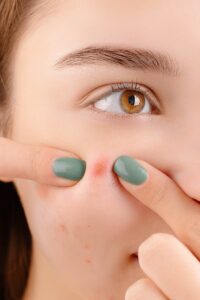
One of the major skin concerns for people with oily skin is getting pimples on the face. Although normally we get them during the summer season, some people might suffer throughout the year. In this article, we will try to find the answer to the biggest question – Why do we get pimples?
Table of Contents
9 Reasons Why We Get Pimples on Face
1. Clogged Oil Glands
The main reason for getting pimples is because of the presence of clogged oil glands in the skin. These are sebaceous glands that end at the hair follicle. They are responsible for secreting an oily substance called sebum.
Sebum is a useful matter that protects the skin from bacteria. Also, it does not let the skin suffer from water loss. Overproduce of sebum causes oily skin and break out. This leads to pimples on the face.

2. Puberty
Puberty is the period when many people suffer from acne and pimples on the skin. This is due to the increased level of testosterone hormone. This hormone is responsible for the growth and development of genitals in boys. Also, they keep the muscles and bones in girls strong. The higher the level of testosterone, the higher the secretion of sebum into the skin. That is why teenagers tend to get pimples and acne during this time.

3.Stress
Stress is not a direct cause of pimples or acne. But, its presence can make the existing acne and pimples worse. Also, it takes a long time to heal the pimples if one is suffering from stress. So, we can say that keeping our stress level under control can help us get rid of pimples fast.

4. Genetic
Some researchers have proved that if pimples run in the family, the children are very likely to get them. So, if your parents had suffered from acne, then you might also get them at a young age.

5.Periods
Many women tend to have more breakout problems during their periods than at other times. It is because estrogen and progesterone decrease just before the start of the period. This causes the oily glands to secrete more sebum.

6. Bacteria
The excess sedum mixed with the dead skin leads to the plugged follicle. This leads to the growth of bacteria. Bacteria can many skin infections. As a result, whiteheads and blackheads appear. Whiteheads are closed pores and blackheads are open pores. The bacteria feeding on the clogged pores turn the white heads and black heads into acne or pimples.

7. Pregnancy
During pregnancy, women go through hormonal changes, especially during the first two trimesters. A hormone called androgens increases during this time. This triggers the overproduce of sebum from the oily glands. This causes pimples during pregnancy.


8. Medical Conditions
Some medical conditions can cause acne. Some of these are:
- Polycystic ovary syndrome
- Cushing Syndrome
- SAPHO syndrome
- Androgen-secreting tumors
- PAPA syndrome
- CAH
- Apert syndrome
9. Diet
Some foods can trigger the overproduction of sebum. Sometimes milk, butter, cheese, and other milk products can lead to increased production of sebum. Also, foods with high sugar can increase the insulin level in the body. This can trigger excess sebum leading to pimples on the face.

 Syrup to keep your skin pimple-free – Click on the picture to buy on Amazon
Syrup to keep your skin pimple-free – Click on the picture to buy on AmazonHow to Reduce the Sebum Production
Now that you know that excess sebum production is the main reason for pimples, you must ensure that the sebum secretion is low. For this, you need to take proper care of your skin. Here are some tips to help you:
- Wash your face with a mild cleanser 2 to 3 times a day.
- Have food high in Vitamin A, Vitamin D, and Vitamin E that can help you to prevent pimples.
- Check if you are suffering from any medical condition.
- Make sure to maintain proper hygiene, especially during periods.
- Avoid too much intake of oily food


 Click on the picture to buy on Amazon
Click on the picture to buy on AmazonPimples are one of the most common skin conditions. Now that you know the reasons why we get pimples, it’s time to take more precautions to avoid the triggers. Make sure not to get stressed if you get pimples or acne. There are many treatments and remedies available to treat them. Also, it is advisable to check with your doctor to know if you are suffering from any medical condition before opting for any remedy.